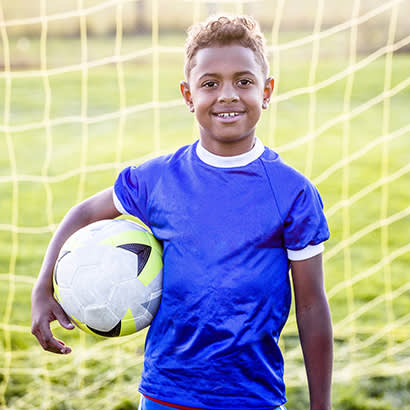
For an enhanced digital experience, read this story in the ezine.
At NRPA, we’ve spent the past year researching the youth sports landscape to learn ways we can support park and recreation professionals as they ensure that all kids have a fun, safe place to play sports — a place where they feel like they belong. The research was clear that when children play sports, they increase their chances to grow up healthy; feel good about themselves; build friendships; develop skills like teamwork, kindness and respect; and are more likely to succeed in school and in their future careers.
At the culmination of our research, NRPA developed goals and principles that guide how we collaborate with park and recreation professionals to ensure all youth have the opportunity, motivation and access to play sports. Because park and recreation professionals are community leaders experienced in working with youth, parents and partners to deliver youth sports, NRPA looks forward to working together to increase youth sports equity at park and recreation agencies, ultimately creating conditions that welcome all youth into sports and provide community-wide access to youth sports opportunities that are safe, fun and affordable.
Centering Equity in Local Youth Sports
This fall, NRPA transitioned into its first year of action. We started by selecting 16 communities to serve as leaders in NRPA’s Youth Sports Strategy — providing grant funding to these park and recreation agencies to test approaches that increase youth sports equity. As we read grant applications, we found the following excerpt from a letter written by a little leaguer to Mayor Jane Castor in Tampa, Florida:
I’ve been playing softball for four years and recently noticed a problem. My home little league...only has ONE softball field and at least FOUR baseball fields. I understand baseball was invented first, but softball needs a little more attention. I am aware boys usually play more sports, but it’s not the [1800s] anymore. Girls are starting to play sports now, in particular softball. At softball, some of my practices have been getting cancelled because there’s a [baseball] game taking place on the field and there’s nowhere else for the game to go. I’m writing to you to get more softball fields EVERYWHERE...
While the letter’s plea is a stark reminder that not all youth have equitable access to youth sports, it also illuminates ways we can work to level the playing field. But we must first acknowledge that sports were not always open to everyone. For example, it wasn’t until the 1964 Civil Rights Act that people of color were allowed to use all recreational facilities and that mixed race sports teams were protected under law.
Park and recreation professionals in Tampa took the letter as a call to action. After assessing field distribution and availability by demographic and neighborhood characteristics, they found that only five of the city’s 39 little league ballfields are playable for softball. Over the next year, the city of Tampa will begin converting several baseball fields to accommodate softball play as part of its goals to reduce gender disparities in sports citywide.
Attracting Families to Your Youth Sports Programs
NRPA seeks to build awareness around the role of park and recreation professionals in building youth sports equity. Over the past year, we heard that park and recreation agencies deliver affordable, close-to-home sports options that emphasize the long-term, healthy development of children. Yet, we found that in many communities, one of the largest barriers to play was quite simple: families aren’t always aware of the youth sports options available at their park and recreation agency.
Quality, community-based sports have become critical during the recovery from the pandemic. This gives park and recreation agencies an opportunity to market their offerings since parents desire more local and affordable options. For this reason, NRPA’s first step to supporting park and recreation professionals as they build relationships with families in their communities is the Youth Sports Communications Toolkit.
Extensive research surrounding family values in youth sports serves as the basis for toolkit messaging. When testing the toolkit messaging with parents and caregivers via focus groups and surveys, nearly all families reported they would be more likely to register their child for park and recreation sports after exposure to the messages.
The free toolkit includes sample outreach copy for email, newsletter and social media promotion, along with a series of customizable graphics. Agencies can add their logo, URL and specific sports offerings to tailor the assets to their community.
Park and recreation professionals across the country are working to develop more equitable access to youth sports and play opportunities for all. As leaders in communities, it is essential that park and recreation professionals center equity-based best practices in their youth sports programs, facilities and policies to ensure all children have access to a safe and welcoming youth sports experience. We encourage you to join us as we build a collective movement toward youth sports equity.
Teresa Morrissey is NRPA’s Program Manager, Park Access. Rachel Banner is NRPA’s Director of Park Access.

